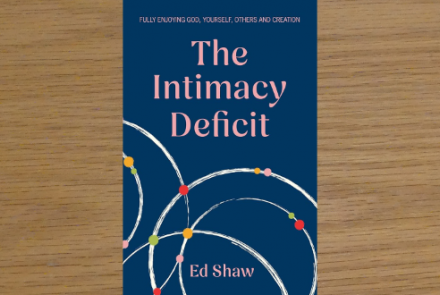Finding Acceptance
“For all have sinned and fall short of the glory of God” (Romans 3:23). As a young child, I sang this well-known scripture verse along with a cassette tape of Bible songs. My mom interrupted me, saying, “You shouldn’t sing that! It’s too negative.” That moment encapsulates how my family, and even my church, felt about sin. It was something we didn’t talk about, or even think about, and certainly not something we ever did.
I was a sheltered home-schooled kid growing up in Kentucky (USA), who just thought gay was an ordinary word in a Christmas song. I had no way to understand or describe the strange way I was starting to see girls. This silence and ignorance became its own, internal, form of opposition. I never understood the other girls ogling over a picture of Jonathan Taylor Thomas or Leonardo DiCaprio, the top-level tween heartthrobs of my day. I always felt strange or different, but it wasn’t until years later that I realised how I was seeing girls was what others would describe as physical or sexual attraction. And I certainly didn’t know that anyone else also experienced those feelings towards someone of the same sex.
As I got a little older, topics of sexuality and orientation would make their way into hushed conversations in my family or at church. The prevailing message was that you were either homosexual and unbiblical, or heterosexual and biblical. I took this as fact and, being a good little Pharisee; I turned my nose up at even the idea that someone could be attracted to another person of the same sex. Somehow, I still didn’t connect my desires and lust for women with what other people described as sexual attraction.
“When did you choose to be heterosexual?”
This connection finally clicked in around 2012 when I was in my mid-20s. I was absent-mindedly listening to the radio when I heard the question, “When did you choose to be heterosexual?” The speaker paused for a moment and then continued, explaining that this question seems ridiculous to heterosexuals because they didn’t choose to be that way. She used this to show that homosexuality is also natural, not a choice someone makes. The problem was, in that brief moment of pause, without knowing her purpose or where the question was leading, I had an answer. I immediately knew the exact date and time I had chosen to be heterosexual.
This thought and realisation startled me, and my mind flooded with memories. I had got together with a guy simply out of curiosity, trying to figure out what the others girls saw in boys. I had sat captivated during a youth group trip as I watched another female slip into pyjamas and my mind ran down a sexual rabbit hole. In a conversation with a friend about the TV show Friends, I couldn’t answer which guy I liked the most, but I knew without question which of the girls I found most attractive. For the first time in my life I admitted to myself, “I’m attracted to women, and this is really all I’ve ever known.”
Feeling alone
But what was I to do with this realisation? Did this admission automatically put me in the category of the “unbiblical” that I had been taught surrounded homosexuality? By this point, God had brought me out of religious legalism into a growing life of faith, but I still believed that the Bible did not leave room for homosexual acts. I thought I was the only person in the world who experienced same-sex attraction yet desired to uphold that biblical view. I reasoned that, as long as I’m single, purity would look similar no matter which gender was the object of my affection. Therefore, I mostly ignored or hid the attractions that lingered.
This was often a lonely place to be, but I trusted that God’s word on this subject was for my good, even when everything in my body was pushing towards something else. As I became increasingly resolved to uphold this biblical truth, the church and denomination I grew up in were swinging in the opposite direction. I had friends I had served with in ministry who came out as gay. I heard them talk about the freedom they had found, and how they could finally be whom God had created them to be in a loving and committed relationship. To them, you could have Jesus and live out of your natural desires. They had no idea that I, too, had wrestled with questions of sexuality and identity in Christ, yet with different conclusions.
Looking for safe community
The churches and ministries I have been part of as an adult have upheld a traditional biblical view of sexuality. I have been blessed by powerful preaching of the Word, small groups and ministries that God used to help me grow, and wonderful friendships and families that included me as one of their own. These relationships and love have been so marvellous and important to me, but I have yet to share my experience with same-sex attraction openly. When the topic comes up, there seems to be so much hatred. “LGBT are all whores; they need to get of here.” “Why would anyone want to be gay? It’s so disgusting!” “Don’t talk to me about LGBT until after you read your Bible.” These are just a handful of things that I have heard said or had been posted online by friends who are followers of Christ. It always feels like a punch in the gut. Like, even though I’m clinging to Christ and doing everything I can to stay pure, that I’m not good enough, that I don’t matter. I see the church dehumanising those with same-sex attraction, and only seeing issues or political agendas, not actual people.
I feel like I have no place in the conservative church conversation because they only recognises the sin of homosexuality, and I have no place in the liberal church conversation because they can’t understand why I won’t just give in. Many believers seem to have never even considered that someone could experience same-sex attraction while still upholding traditional biblical purity. This seems to be changing and, as I’ve shared with some close friends, they have met me with a desire to learn more and walk with me, as I seek to honour Christ while still experiencing same sex attraction. Finding TFT has been so encouraging because I now have community and fellowship with others who understand that tension and stand with me, pointing me to Christ without negating the reality of orientation.
I think the wider body of Christ needs to enter this conversation. A conversation where we recognise the value and personhood even of people who wrestle with same-sex attraction, a conversation in which we acknowledge the possibility of experiencing same-sex attraction without necessarily giving in to the temptation. A conversation that encourages everyone (married or single of any sexual orientation) to pursue sexual purity no matter the sacrifice, because Christ is better.
This book review was originally published in the Summer 2021 edition of the TFT magazine, Ascend. Click the button below to download your copy.
Download the Summer 2021 edition of Ascend






